Peking University, Aug. 19, 2010: Noam Chomsky, Institute Professor of Massachusetts Institute of Technology (MIT), world-renowned American contemporary scholar, linguist, political critic, and social activist, received a PKU honorary doctorate on the evening of August 13.
He delivered a lecture titled “Contours of World Order: Continuities and Changes” in the conferment ceremony at Peking University.
Prof. Chomsky is regarded as one of the most significant western philosophers visiting China besides Russell and John Dewey. During that night, PKU Hall was fully occupied; more than 2000 audiences among whom were scholars and students in the fields of linguistics, philosophy, mathematics, psychology, and computer science and technology, from various universities and research institutes, as well as people from various professions attended the lecture.
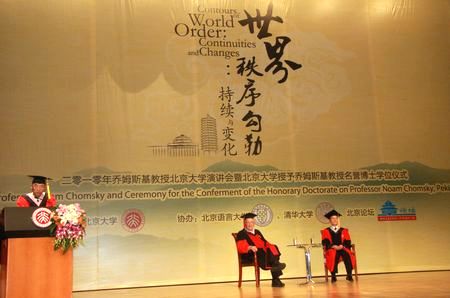
Lecture of Prof. Noam Chomsky and the Conferment of the PKU Honorary Doctorate on Professor Noam Chomsky at PKU Hall
At the ceremony, Prof. Zhou Qifeng, President of Peking University and Member of the Chinese Academy of Sciences (CAS), awarded Prof. Chomsky the honorary doctorate certificate. President Zhou pointed out in his speech that Prof. Chomsky’s receipt of an Honorary Doctorate from a university in China and his first delivering of a public speech in the Chinese mainland made that night special. He believed that this occasion would leave Prof. Chomsky with a deep impression.
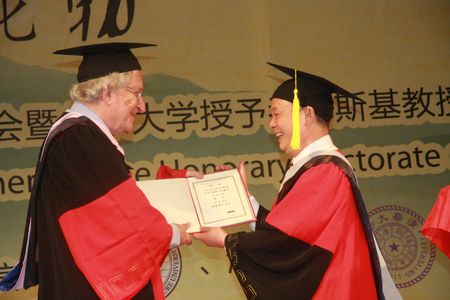
PKU President Zhou Qifeng conferring Honorary Doctorate on Prof. Chomsky
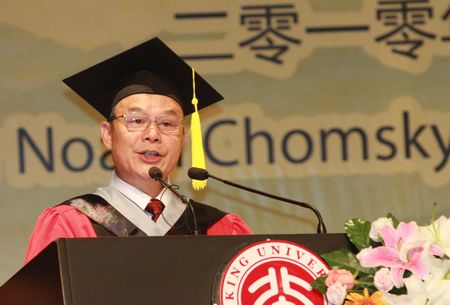
PKU President Zhou Qifeng’s speech
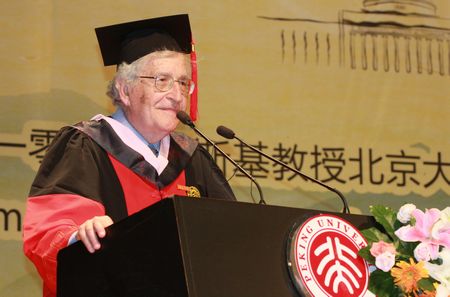
Prof. Noam Chomsky’s acceptance speech
After the ceremony, Prof. Chomsky gave a lecture, focusing on “contours of world order”. As the most influential contemporary political critic and social activist, Prof. Chomsky analysed the changes in international relations since the Second World War; he discussed situations in hotspots such as Iraq and Iran and trend of development in major regions such as Europe, Americas and Asia. Prof. Chomsky criticized the United States as before for maintaining its global plan of controlling the world after the Cold War in this ever-changing new world. He pointed out that the so-called “stability” in imperial jargon meant “obedience to the will of the powerful” while “resistance to their will was ‘destabilizing’, even harmful to the whole world. What the US most concerned about were its own interests in international affairs and to ensure the development of democracy within its control.
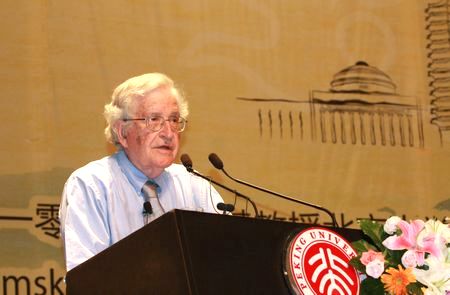
Prof. Chomsky at his lecture
Although it was the first time that Prof. Chomsky came to the Chinese mainland, he made an analysis of the rise of Asia, and the rise of China in particular, with his extensive international knowledge, keen observation and deep thinking. In his view, the order of the world powers was undergoing a drastic shift; some nations were gradually breaking away from the former framework of the global political power and returning to their own interests and development while playing increasingly significant roles in international affairs. As a regional producing system, China played an increasingly important part in international trade; however, it still faced several problems concerning the environment, ecology, social justice, etc, which remained to be solved, at home.
After the lecture was the Question and Answer section. One audience asked Prof. Chomsky to describe himself with a word after picturing the world order. Prof. Chomsky smiled and said, shrugging his shoulders, “My life is too complicated to describe. I have always devoted myself to the researches of politics and science.” He recalled his first essay written in 1939 at the age of 10, which commented on the surrender of Barcelona during Spanish civil war and was published on the school journal. Eventually, Prof. Chomsky said that although circumstances changed all the time, his promise never would, and he hoped to devote the rest of his life to scientific research as he always spared no efforts to assuage the suffering of human beings. His sincere words won warm applauses.
When one graduate from University of Pennsylvania asked Prof. Chomsky about his impression of school days, Prof. Chomsky answered without mincing his words that he disliked life at high school and remembered little of what was taught at school. During his college years at University of Pennsylvania from 1945 to 1949, he used to think of shifting his major because he found his courses rather boring, but later on he took courses on linguistics under the influence of Zelling Harris, a famous American structuralism linguist. Prof. Chomsky also said that he hardly obtained any certificate, and for this reason, he might not find a job. Afterwards, he went to MIT where only one’s work counted not one’s certificates. Prof. Chomsky started working at MIT since 1955, offered courses on linguistics for graduate students, and founded the department of linguistics and philosophy in 1976 where he taught till retirement.
Prof. Huang Zhengde from Harvard University, student of Prof. Chomsky, told the audience in his speech that Prof. Chomsky was in fact very amiable, especially to students, although he was often deemed as a difficult person for his sharp criticism on politics. Due to his heavy schedule, Prof. Chomsky would arrange appointments with the media a few months later; however, appointments with students would be arranged within a week and would never be delayed or canceled. Prof. Huang also pointed out that it was Prof. Chomsky himself who criticized and revised his own theory the most.
At the end of the Q&A section, when asked whether he had some ways to relax like Einstein playing the violin, Prof. Chomsky replied straightforwardly, “I will go to work.” On hearing the answer, the audience could not help laughing but meanwhile felt Prof. Chomsky was indeed respectable.
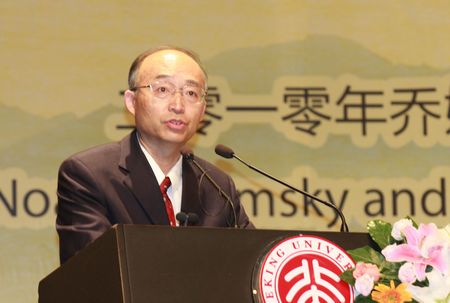
Prof. Wu Zhipan, Executive Vice President of PKU, conducting the ceremony
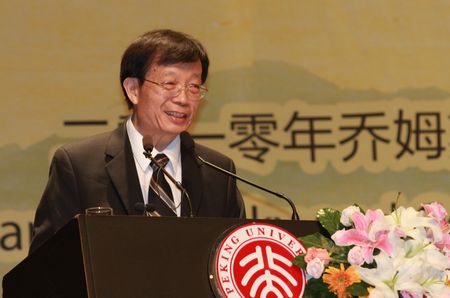
Prof. Huang Zhengde, Professor of Harvard University, Changjiang Scholar at Beijing Language and Culture University, conducting the Question and Answer section
This ceremony was sponsored by Peking University, and co-sponsored by Tsinghua University, Beijing Language and Culture University and Beijing Forum. PKU Chinese department organized the event with support from PKU leadership and various institutes. The ceremony was conducted by Prof. Wu Zhipan, Executive Vice President of PKU and Prof. Huang Zhengde, Professor of Harvard University, Changjiang scholar at Beijing Language and Culture University conducted the Question and Answer section.
On the afternoon of August 14, 2010, Prof. Chomsky had a meeting with the press at PKU Lake View Hotel.
Prof. Chomsky also had visited and given public speeches at the Academia Sinica and Tsing Hua University in Taiwan, and Beijing Language and Culture University on the mainland.
Background Info:
Noam Chomsky (1928--), Institute Professor at MIT, member of AAAS, the US National Academy of Sciences and National Academy of Liberal Arts. He ranks No. 1 on the list of one hundred the contemporary world’s “most influential” public intellectuals. He is one of the top ten greatest scientists in the 20th century, among whom was Einstein, selected by the US journal Science.
The theory founded by Prof. Chomsky not only holds a milestone position in linguistics, but also promotes other fields such as philosophy, psychology and computer science. Prof. Chomsky established “generative linguistics” based on the model of formalism. This theory is widely regarded as a landmark in the science of linguistics and cognitive science and set off a “Cognitive Revolution.” Chomsky advocates rationalism psychologism and criticizes empiricism and behaviorism. He is the most important representative in contemporary philosophy and cognitive science. Chomsky thinks that the innate human language ability is the result of genetics and to perceive linguistics as cognitive psychology, and ultimately a part of biology is the science to study human brain. For this theory, the American Psychological Association presented Chomsky the award of “Outstanding Scientific Contribution.” Computer science, especially programming language grammar as well as the rise and development of information processing science are closely related to Chomsky’s theories. Therefore, Chomsky is also called “the father of information processing of computer science.” Chomsky has written over 40 books on the functions of universities, responsibilities of intellectuals, the Western mainstream media’s one-sided tendency, the US hegemony, social movements, and other fields. His 9-11 and Imperial Ambition touched upon the changes in the world after 9/11. He is considered as the contemporary world’s most influential political critic and social activist.
Edited by: Su Juan and Zhang Chunlan
Translated by: Chen Miaojuan
Source: PKU News (Chinese)